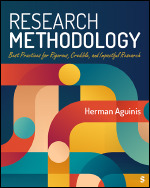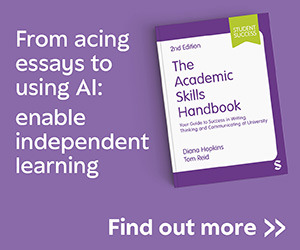Research Methodology
Best Practices for Rigorous, Credible, and Impactful Research
- Herman Aguinis - The George Washington University School of Business, USA
Included with this title:
LMS Cartridge: Import this title’s instructor resources into your school’s learning management system (LMS) and save time. Don’t use an LMS? You can still access all of the same online resources for this title via the password-protected Instructor Resource Site. Learn more.
Read a review of the book published in the Academy of Management Learning & Education journal here.
Supplements
Online resources included with this text
The online resources for your text are available via the password-protected Instructor Resource Site, which offers access to all text-specific resources, including a test bank and editable, chapter-specific PowerPoint® slides.
Online resources included with this text
The online resources for your text are available via the password-protected Instructor Resource Site, which offers access to all text-specific resources, including a test bank and editable, chapter-specific PowerPoint® slides.
This is an interesting, fresh approach, describing the development of research methodologies throughout the years… Much better than my current textbook.
This book is easy to read and teach. Students can understand the language and be able to use it with their own research. It is both modern and has history of research within it. Overall, students would benefit in early research to using this book.
I can think of no other research methods book I've recently used that devotes this much attention to theory and I think this attention is well-deserved.
The discussion or parsimony, falsification, and precision within this book are particularly welcomed and map precisely how I teach these topics.
I like that there is a chapter devoted to making connections to theory. This is novel. I have not seen such a chapter in similar texts, and it is important. Often junior scholars ask questions for the sake of simplicity or curiosity but lack the skills to link their inquiries to theory. This chapter is a useful contribution!
A high-level but readable textbook presenting research design and methods in an approachable way. The text would be appropriate for graduate level psychology, organizational behavior, or decision sciences courses in research methods.
I would describe this book as a long-form publication that provides knowledge on methodological best practices in social and behavioral science disciplines. The writing is explicit and bridges the gap between knowledge and applicability and presents a comprehensive review of the research process from beginning to end.
The text combines research methods and statistics and could work very well for graduate-level programs with combined coursework.
Nice title with clearly laid out and concise information. Will be very useful for a student wishing to explore more on this topic.
This extraordinary method driven research book is packed full of information and insights on every page, with fresh perspective to be gained from every chapter.
The book was printed on thin paper with a sheen which might impact the experience of some readers.
The contents of the work will provide help and information for undergraduates upward to seasoned professional. The amount of work which has gone into this volume is staggering. I found the extensive glossary section useful, and the meticulously filled reference section reassuring.
Sample Materials & Chapters
Chapter 1 How to Understand the Current Methodological Landscape
Chapter 2 How to Conduct Ethical Research


